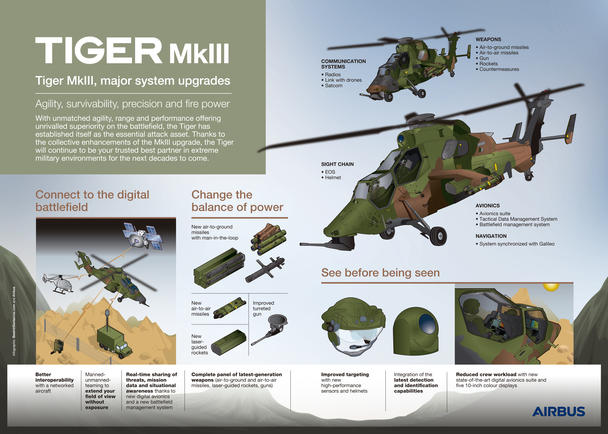Aviation
France and Spain launch Tiger MkIII programme

Marignane, 02 March 2022 – OCCAR (Organisation for Joint Armament Cooperation), on behalf of the French and Spanish Armament General Directorate, the DGA (Direction Générale de l’Armement) and the DGAM (Dirección General de Armamento y Material) has awarded a contract to Airbus Helicopters for the development, production, and initial in-service support of the Tiger MkIII attack helicopter upgrade programme..
The contract includes the upgrade of 42 aircraft for France (with the possibility to add another 25 helicopters) and 18 for Spain. In addition, the contract provides the possibility for Germany to later join the Tiger MkIII programme. The first prototype is scheduled for an inaugural flight in 2025. First delivery to the French Armament General Directorate (DGA) will take place in late 2029 followed by a first delivery to Spain in 2030. Development and upgrade work will be conducted in Airbus Helicopters facilities in Albacete (Spain), Marignane (France) and Donauwörth (Germany).
Tiger MkIII is a comprehensive upgrade of the European attack helicopter’s systems. Proven in combat, the Tiger is difficult to detect, highly agile, and highly survivable, something operators will continue to benefit from with the MkIII upgrade. The new standard will allow the platform to be connected to the digital battlefield in order to perform manned-unmanned teaming as well as share tactical information in real time. It will also provide an unrivaled range of weapons (turret gun, laser-guided rockets and missiles) and renewed detection and targeting capabilities. The integration of state-of-the art avionics will reduce the crew’s workload and enable them to be fully focused on mission execution.
What makes Dassaults Rafale fighter jet so special?

The Tiger MkIII standard configuration will include the integration of the Safran Strix NG sights, the Thales FlytX avionics suite, the Topowl DD helmet-mounted sight display, an Indra IFF upgrade, Thales GNSS, and Safran’s inertial navigation system. The communication suite will be upgraded with Thales’ Contact/Synaps radio and data links dedicated to manned/unmanned teaming. Moreover, for Spain Link16 and SATCOM functionalities will be included. The Spanish Tiger MkIII will be equipped with a battlefield management system and countermeasures provided by Indra, whereas the French Tiger MkIII will be equipped with a battlefield management system by ATOS and countermeasures provided by Thales. The new weapon package for France will include the MBDA MAST-F (Future Tactical Air-to-Surface Missile) and Mistral 3 air-to-air missile. For Spain, new capabilities will include 70mm guided rockets and a new air to ground missile.
What makes Dassaults Rafale fighter jet so special?
Airbus Helicopters is fully committed to supporting the Tiger fleet. In 2019, a tri-lateral Global Support Contract was signed with OCCAR. It aimed at boosting the availability rate of the Tigers in service in the French, German, and Spanish Armies. Thanks to this contract, the availability rate for the French Army Tiger fleet has been significantly progressing over the past couple of years. Further positive results are expected in the coming months in Spain, Germany and France.
@AirbusHeli @EjercitoTierra @armeedeterre @DGA @DGAM #TigerMKIII

Aviation
Boeing, Antonov to Collaborate on Defense Projects

– MOU represents Boeing’s commitment to work with Ukrainian industry
– Includes exploring opportunities for collaborating on in-country support of Unmanned Aerial Systems
A Memorandum of Understanding was signed today by Boeing and Antonov Company to investigate potential collaboration on defense-related projects.
“We’re happy to keep collaborating with the Antonov Company to help Ukraine’s economic development and expansion,” stated Ted Colbert, CEO and president of Boeing Defence, Space, & Security.
Airbus and the Antonov An-225: The Best Partnership:Click here
“This agreement demonstrates our ongoing efforts to find more opportunities to work with Ukrainian industry, which was underscored by our signing of the Ukrainian Defence Industry Compact earlier this year.”
The areas of potential collaboration identified in the agreement consist of training, logistical support and overhaul services for tactical Unmanned Aerial Systems utilized by the Ukrainian Armed Forces, which includes the ScanEagle. In addition, the companies will also explore opportunities for Antonov to provide engineering support to Boeing.
The six largest cargo aircraft ever built in the aviation industry:Click here
“A strong, innovative, and efficient defense industry is key to sustainable economic development and national security, and we are extremely excited to collaborate with Boeing,” said Ievhen Gavrylov, CEO of Antonov Company.
This agreement brings a whole new level of opportunity to implement the latest and most effective solutions – in addition to the possibility of future projects with Boeing in the aerospace and defense industry.”
-

 Travel1 week ago
Travel1 week agoAir India to Expand US Operations with Three New Routes After a Decade
-

 Travel2 weeks ago
Travel2 weeks agoWhy We Should Avoid These Stamps in a Passport
-

 Airlines1 month ago
Airlines1 month agoInvestigations Reveal Fake Chinese Titanium in Boeing and Airbus Jets
-

 Tech4 weeks ago
Tech4 weeks agoChina’s CATL Plans 1,800-Mile Electric Plane Launch by 2027
-

 Airport3 days ago
Airport3 days agoTop 10 Largest Airports in the World by Size
-

 Aerospace4 weeks ago
Aerospace4 weeks agoChina’s Fighter Jets Turn Wings into Autonomous Drones
-

 Airlines4 days ago
Airlines4 days agoAir India Rolls Out A350s for Delhi-New York JFK and Newark Routes
-

 Defence3 weeks ago
Defence3 weeks agoBoeing Enhances Chinook with New Engines and Block II Upgrades at $96 Million







